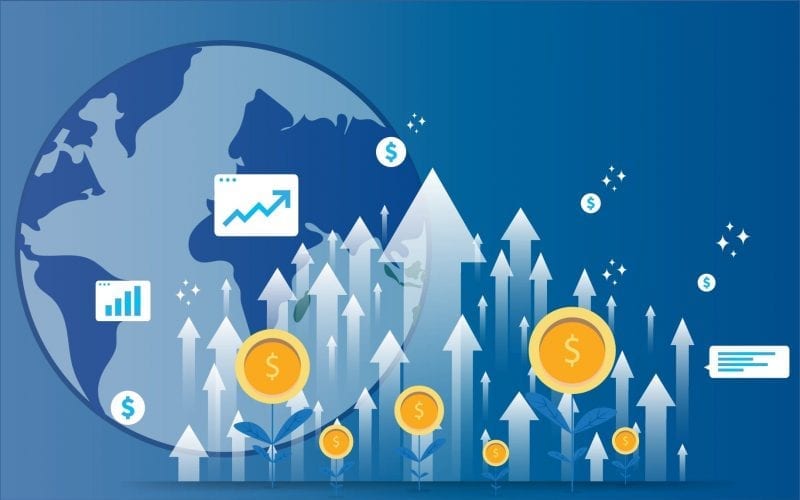The exchange of goods and services is considered as a prominent part of every economy. Every nation across the globe, strives to maintain harmonious relationships with other countries, especially when it comes to commerce and trade. Coming under the vast domain of Economics, International Economics is specifically concerned with the study of the implications involved in global level trades. With rewarding career opportunities on offer, the field is gaining popularity and has become one of the most sought-after specialisations in Economics. Want to study a Masters in International Economics? Read this blog to know all about the top universities, admission requirements and career scope offered by a master’s degree in International Economics.
This Blog Includes:
What is International Economics?
International Economics focuses on the analysis of international investments and trading of goods and services. For instance, the overseas trade between India and various other countries across the globe ensures the availability of many international products in the Indian market, be it food, cosmetics, accessories, amongst others. The field predominantly studies the international capital flows with respect to the trade that takes place between two or more countries. It lays major importance on two aspects, i.e. International Trade and International Finance. The former is all about examining the consequences that arise in trade of goods and services whereas the latter is concerned with the liquidity of funds in international asset markets.
Course Overview
Out of all the branches of Economics, international economics is mainly offered as a specialisation at the masters level. You can pursue degrees like MA, MSc or MS in this field and learn about the intricate theories and policies of international trade. You will understand the trade and financial issues faced by the global economies from the empirical and theoretical perspective. Along with this, you will also get to explore questions like “What are the barriers to the free flow of capital, goods and labour?”, “What has led to the increase of international trade over the last decade?” and much more.
Masters in International Economics Courses
Now that you are familiar with the course details, let’s go through the popular master’s programs offered in International Economics courses. Take a look at the following table enlisting the top master’s degrees in International Economics
| International Economics MSc | Master of International Development | MA International Economics |
| Development and International Economics MA | International Economics, Finance and Development MSc | MSc Global Corporations and Policy |
| MSc International Economic and Social Justice | International Economics, Banking and Finance (MSc) | Global Economy MSc |
| Master of Global Management Major in International Economics and Finance | Master of International Economics and Finance | MSc East Asian Development and the Global Economy |
Eligibility Criteria
To secure your admission in the aforementioned courses, you need to fulfil the entry requisites specified by your chosen university. Here are some of the general eligibility requirements for masters in International Economics programs:
- Formal education of 10+2 from a recognised institution
- An bachelor’s degree in Economics like BA Economics or in any other commerce-related field with minimum GPA or percentage required
- If you are planning to study abroad, you will also have to provide English proficiency scores such as IELTS/TOEFL, etc along with LORs and an SOP
- Some universities may also ask applicants to submit scores of GMAT or GRE
Top Universities
Once you have chosen a suitable program, the next step is to explore the best universities to pursue your course from. Many top universities in the world offer masters in International Economics. Take a look at the popular universities for Masters in International Economics:
- The University of Glasgow
- The University of Queensland
- University of Surrey
- Glasgow Caledonian University
- Cardiff University
- University of Nottingham
- Wichita State University
- University of Bristol
- Newcastle University
- SOAS University of London
Career Scope
After graduating with a Masters in International Economics, you can explore many lucrative opportunities in the corporate, research and public sector. If you are planning to build a career in research, you will be working on the analyses of economic trends and data across varied economies. If you want to attain more detailed knowledge of this field, you can further pursue a PhD in Economics with a specialisation in International Economics. Enlisted below are the major job profiles that are offered to the graduates of this field:
- Financial Risk Analyst
- Economist
- Data Analyst
- Accountant
- Financial Planner
- Actuary
- Investment Analyst
- Economic Researcher
- Financial Consultant
We hope that this blog provided you with the course details of masters in International Economics. Planning to study a degree in Economics? Our Leverage Edu experts are here to help you find the best program and university as per your preferences and requirements! Sign up for a free session with us now!

 One app for all your study abroad needs
One app for all your study abroad needs






















 45,000+ students trusted us with their dreams. Take the first step today!
45,000+ students trusted us with their dreams. Take the first step today!


